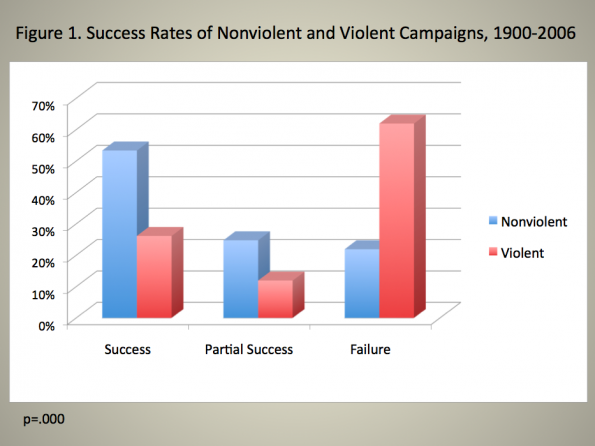Naked Capitalism Blog — which I would currently rank as the most essential reading in blogdom — reports on a study arguing that resistance movements that adopt non-violent methods are substantially more likely to prevail against authoritarian regimes than those movements that turn to violence:
Erica Chenoweth has developed a dataset and analyzed the historical record. Below the fold are slides summarizing the results of her study of 323 non-violent and violent campaigns from 1900-2006. (There are twenty slides, so anybody with a slow connection may prefer to download a zipped file of the original PDF).

I do wonder if the movements that turned to violence may have known something about the regime, so that there might be some self-selection bias. But then who can know that much about a regime when starting a mass opposition movement?

Can you point to the source document? I’d like to see the violent/non-violent definitions and assessments. For example, I would want to know how Israel was defined or whether Mexico was included.
According to the Naked Capitalism post, the paper is not yet published. The full set of slides certainly raise, but don’t answer, a ton of questions. The blog reports that the paper “will be delivered by Professor Chenoweth at this year’s International Studies Association Annual Meeting at a special workshop in advance of the proceedings not yet listed in the program.”
As Mr. Gorelick has noted, this entire things rests upon the data actually used (which the slides don’t even hint at).
For one example: Is the Russian Revolution taken into account? Was it considered successful or not? How was it weighted? (Do you count the Russian Rev. the same as OWS?)
Slide presentations like this are entirely meaningless without knowing the data.
I am reminded of the famous quote attributed to Zhou Enlai by Henry Kissinger: Upon being asked by Kissinger whether he thought the French Revolution had been a success, Zhou replied “It is too soon to say.”